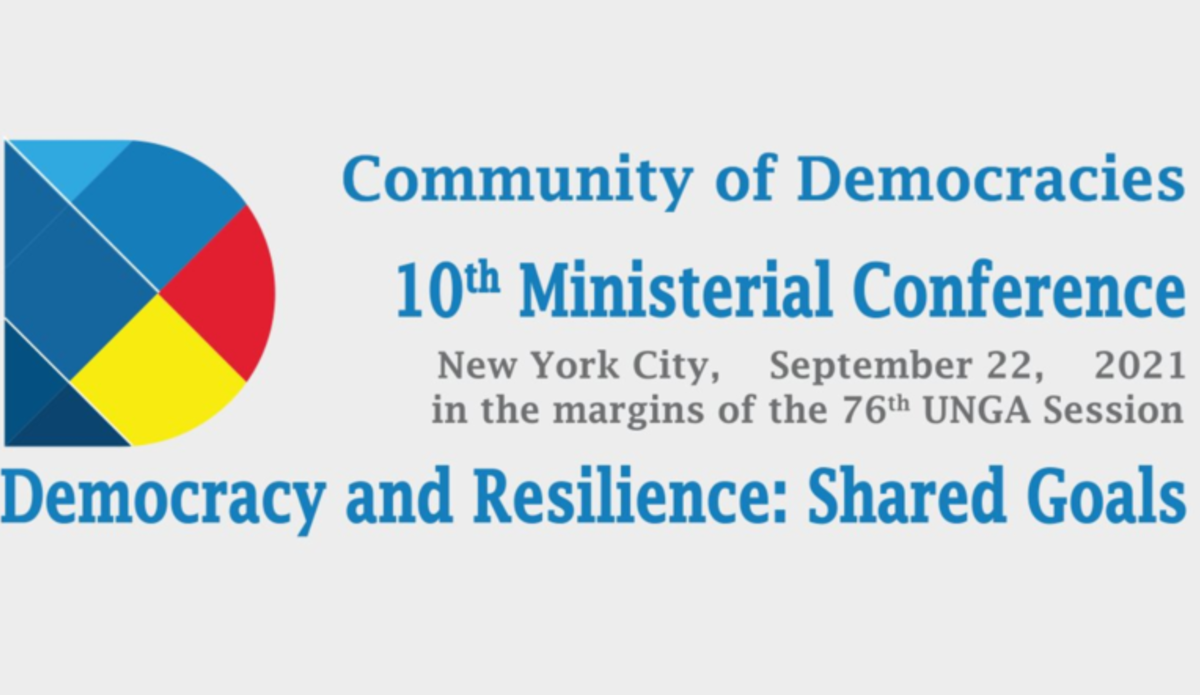Excellencies,
I am pleased to join you and represent the Secretary-General today.
At the outset, I would like to acknowledge Romania’s important role in leading the Community of Democracies since 2019, especially under exceptional circumstances due to the COVID-19 pandemic. I also commend Romania’s efforts to ensure that the full and meaningful participation of women is a priority issue for the Community’s work.
This year’s Conference takes place at a critical moment. The COVID-19 pandemic has impacted all facets of our lives. It has laid bare our shared vulnerabilities: the weaknesses in global and national preparedness; the persistence of long-lasting grievances; and a disenchantment with public institutions and political leadership.
To be clear, these problems were not created by the pandemic. For many years, we have allowed them to fester, unchecked. For example, in traditionally stable democracies, we have seen over the last decade a gradual erosion of trust in representative processes and institutions.
Many people believe that, in their daily lives, these processes and institutions are not delivering on their fundamental promises: to promote equality; to provide social protection; to ensure justice and the protection of human rights.
Alongside this democratic malaise, we are also witnessing backsliding in many “young” democracies. Whether they use the trappings of a democratic system or appeal to so-called “true” democracy to subvert the popular will, authoritarians of all stripes are increasingly audacious.
The pandemic has exacerbated these trends. It has helped drive people towards polarization, and at times violence. It has led many to challenge the central tenets of democratic societies.
And it has made people and their leaders question the effectiveness of the multilateral system, which has not been able to fully come together to address the pandemic and its consequences
Excellencies,
This is the time to act.
If the pandemic demonstrated how fragile the international community is, it also showed how interconnected we are. Truly global threats, such as pandemics and the climate emergency, underscore the necessity of joined-up global action. Deadly viruses or extreme weather events do not respect national boundaries.
Today, I want to highlight three ways in which we can adapt.
First, at the national level, we need more inclusive societies. Groups that are excluded from decision-making must have a real say and find representation in political institutions. If we are truly to address the democratic deficit in the world today, we must take meaningful steps to ensure that women, youth, minorities, marginalized communities and those holding divergent views can participate fully in public life.
Second, at the international level, we need more solidarity. A multilateral system based on cooperation for the common good is indispensable if we are to address the threats we face and build peaceful societies, advance human rights, and attain sustainable development.
The multilateral system itself needs to evolve and become more inclusive and networked. This will require making space for new constituencies that are critical to addressing our common challenges – civil society, local governments, and the business sector, for example.
And third, we need to prepare better to respond to future challenges, none more critical than the climate emergency. From the perspective of the Department that I lead, this includes putting a central focus on prevention.
We need to change our approach to the maintenance of international peace and security and favor the prevention of crises. We know conflict prevention is less costly in human lives and resources than picking up the pieces after war. Prevention also means helping to build peaceful and resilient societies – the fundamental goal of the Sustainable Development Agenda.
Ladies and gentlemen,
Two weeks ago, the Secretary-General submitted a report on Our Common Agenda to the General Assembly. Drawing on broad consultations, the report presents a blueprint for these changes at the national and international level.
The Common Agenda embodies a vision for a reinvigorated multilateral system as the basis for more inclusive and resilient societies. It places particular focus on the role of youth and future generations. We acknowledge the need to give these constituencies more agency to address challenges that they will confront up close in the future.
We must remain clear-eyed about the magnitude of the task we face. The Common Agenda gives us a framework to work on revitalizing the global consensus, grounded in solidarity within and between societies.
We count on the support of the Community of Democracies in advancing this ambitious agenda.
Thank you.

